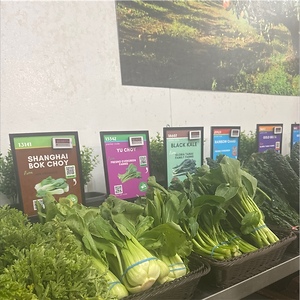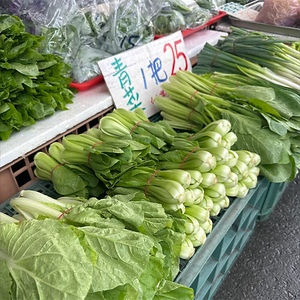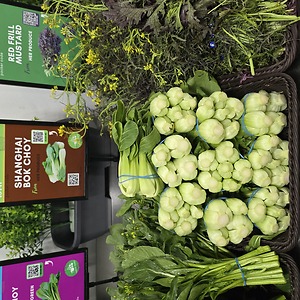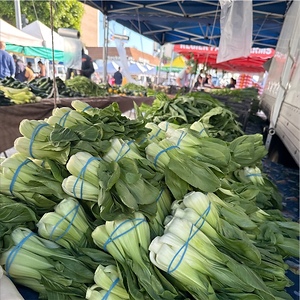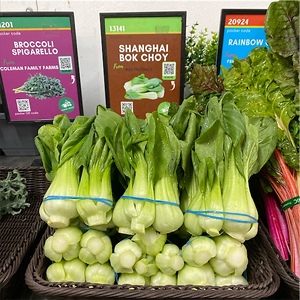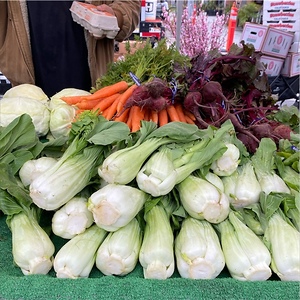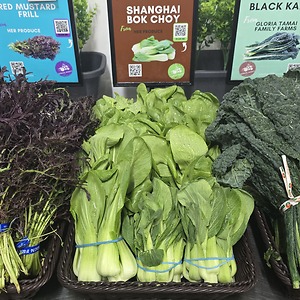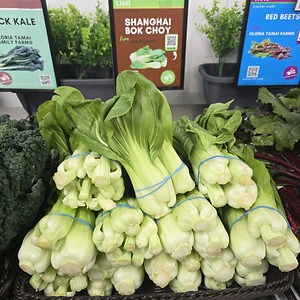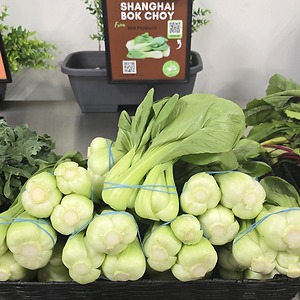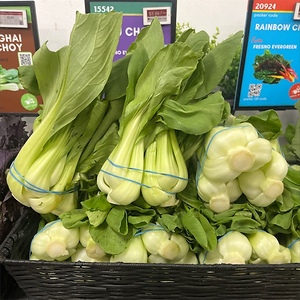

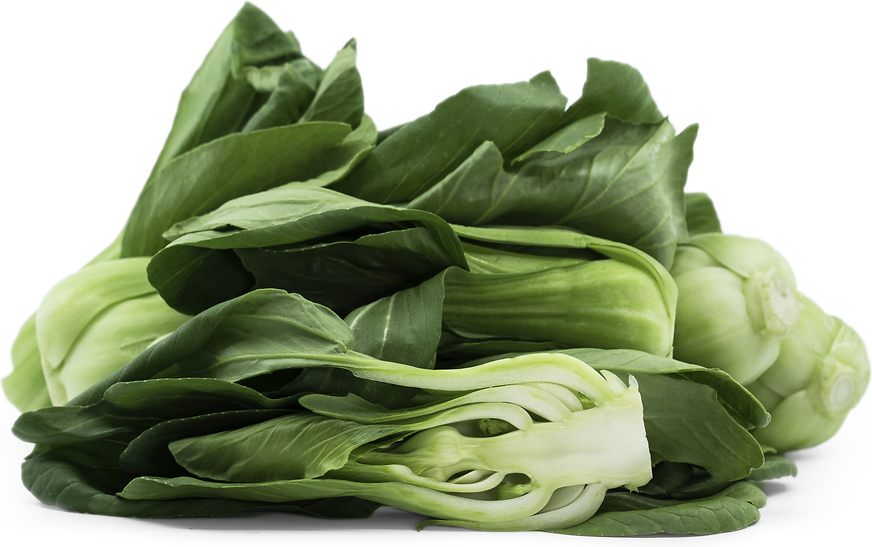
Shanghai Bok Choy
Estimated Inventory, bunch : 70.00
This item was last sold on : 07/31/25
Description/Taste
Shanghai Bok Choy is small, averaging 4 to 12 centimeters in length, and has a central base connecting overlapping, rosette-like layers of upright, loosely bunched stems and leaves. The stems are curved and feature a lightly striated surface with a thick, firm, and wide nature. Shanghai Bok Choy stems typically appear pale to light green, often compared to the color of jade, and the bottom of each stem is curved like a soup spoon. The leaves form along the tops of the stems and have a broad, flat, and pliable texture with a soft, crisp, and tender consistency. The oval leaves are dark green with some veining and become rich, emerald hues when heated and wilted. Shanghai Bok Choy is edible raw or cooked and has a crunchy, succulent, and slightly chewy texture. The stems and leaves are milder than other bok choy types and have a refreshing, neutral, subtly sweet, green, and vegetal taste with celery and cabbage-like nuances.
Seasons/Availability
Shanghai Bok Choy is available year-round, with a peak season in the early spring and fall.
Current Facts
Shanghai Bok Choy, botanically classified as Brassica rapa var. chinensis, is a dwarf variety belonging to the Brassicaceae family. The small, non-heading cabbages were developed in China and were commercially released as an improved type of bok choy. Shanghai Bok Choy is also known in markets as Shanghai Qing, Green Stem Bok Choy, Shanghai Green, Green Bok Choy, and Spoon Cabbage. The variety has spread in popularity worldwide as a culinary ingredient and is sold in its full-grown, dwarf size or harvested young as Baby Shanghai Bok Choy. Chefs and home cooks choose Shanghai Bok Choy for its milder flavor, easy-to-prep nature, and high nutritional properties with low calories. It is important to note that Shanghai Bok Choy is specifically bred for its small size and is one of the most common types of bok choy sold internationally, especially in the United States, Europe, and Asia. Shanghai Bok Choy is a versatile culinary ingredient incorporated into a wide array of fresh and cooked, savory dishes.
Nutritional Value
Shanghai Bok Choy has not been extensively studied for its nutritional properties. Bok choy, in general, is a source of vitamins A, B, C, and K to contribute to energy production, maintain healthy organs, strengthen the immune system, and support faster wound healing in the body. Bok choy also provides fiber to aid digestion and minerals like calcium, potassium, magnesium, manganese, and iron. Calcium supports bone and teeth health, while potassium helps the body balance fluid levels. Magnesium assists in controlling daily nerve functions, manganese contributes to energy production, and iron develops the protein hemoglobin for oxygen transport through the bloodstream. In Traditional Chinese Medicine, bok choy is believed to help blood circulation and detox the body.
Applications
Shanghai Bok Choy has a mild, subtly sweet, and vegetal flavor suited for fresh and cooked preparations. This type of bok choy is readily available in markets worldwide, expanding its use beyond traditional recipes. Tender stems and leaves can be chopped and added raw to salads, slaws, and grain bowls as a textural element to add crunch and fresh flavors. Historically, Shanghai Bok Choy is quickly cooked and is commonly stir-fried, blanched, steamed, and boiled in Asia. Smaller bok choy can be cooked whole, while some chefs choose to cut them in half lengthwise. Shanghai Bok Choy is stir-fried with aromatics like garlic, ginger, and green onions and tossed in soy sauce as a simple side dish in China and Taiwan. The stems and leaves are also served with mushrooms, fried eggs, minced meat, or oyster sauce. Blanched Shanghai Bok Choy is mixed into cold noodle dishes, chopped into rice, or added to tofu as a balanced main. Worldwide, Shanghai Bok Choy is simmered into curries and soups, especially pho, ramen, wonton, and pork rib soups. Shanghai Bok choy pairs well with meats such as poultry, pork, beef, and duck, seafood, snow peas, cucumbers, carrots, sesame seeds, and sauces such as soy, hoisin, and oyster. Whole, unwashed Shanghai Bok Choy will keep for 3 to 5 days when loosely stored in a bag or wrapped in a damp towel and placed in the refrigerator’s crisper drawer.
Ethnic/Cultural Info
Shanghai Bok Choy is famously used as a fresh green in vegetable rice, sometimes known as Shanghainese vegetable rice, a traditional dish commonly made in the Zhejiang and Jiangsu Provinces and the Shanghai municipality of China. Vegetable rice can be traced to ancient times when leftover rice was mixed with vegetables and meat as a frugal lunchtime meal to feed laborers and workers who typically spent their days outside. The dish was later adapted for office workers and evolved to include available ingredients readily found on hand. Bok choy is a popular vegetable for the rice as it adds a mild flavor and crunch without overpowering the dish. The green coloring of the stems and leaves also adds definition to the mixed rice while infusing a fresh, natural taste to complement the rich and savory notes of the minced meat. Shanghainese vegetable rice is considered a type of fast food and has remained an easy, low-cost meal. The dish has since spread internationally and is made worldwide as an everyday main dish.
Geography/History
Shanghai Bok Choy is believed to have been created in the late 20th century in China. Bok choy, as a general category of greens, has been cultivated in China since ancient times, and varieties have been selectively bred over time for improved traits and characteristics. In the 1970s in Shanghai, green vegetables suffered from disease during cultivation, limiting the number of vegetables available in the winter season. In 1975, the Horticulture Institute of the Shanghai Academy of Agricultural Sciences formed a research team to study and breed new cultivars of green vegetables. The team spent over eight years breeding and eventually created a new type of dwarf bok choy with increased disease resistance. The new dwarf variety also produced high yields and had a shorter, spoon-like appearance, the desired shape expressed by consumer market demand. In 1982, the new dwarf variety received positive feedback from the press, and seeds were released for mass production. One seed company in Shanghai labeled the new dwarf variety as “Shanghai Qing,” meaning Shanghai Green, and the name became established as a common descriptor. Since its creation, several types of Shanghai Bok Choy have been developed and released, all collectively sold under the same name in retail markets. Shanghai Bok Choy is commercially grown worldwide and is a prevalent type sold in fresh markets, retailers, and wholesalers.
Featured Restaurants
Restaurants currently purchasing this product as an ingredient for their menu.
| Espadin | Temecula California | 951-383-5585 |
| Cal A Vie | Vista CA | 760-945-2055 |
| Marriott Marina Kitchen | San Diego CA | 619-234-1500 |
| Lauberge Del Mar | Del Mar CA | 858-259-1515 |
| US Grant Hotel Grill | San Diego CA | 619-232-3121 |
| Juniper & Ivy | San Diego CA | 858-481-3666 |
| Inn at Rancho Santa Fe | Rancho Santa Fe CA | 858-381-8289 |
| DS Catering Kitchen | Chula Vista CA | 619-703-9321 |
| Little Victory Wine Market | Carlsbad CA | 310-738-3380 |
| Pizzeria Luigi | San Diego CA | 610-539-7025 |
Recipe Ideas
Recipes that include Shanghai Bok Choy. One



